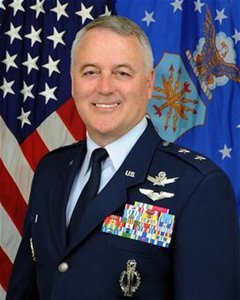Major General Michael Carey, who was in charge of the US Air Force’s long-range nuclear missiles, has been sacked due to “loss of trust and confidence”, officials have said.
Michael Carey’s removal was for “behavior during a temporary duty assignment”.
The sacking was not linked to the operation of the nuclear arsenal, which was safe, the officials insisted.
On Wednesday the US Navy announced an admiral overseeing nuclear weapons forces had been sacked from the role.
That was due to illegal gambling activities, officials said.
Michael Carey is a two-star general in the 20th Air Force and was responsible for maintaining intercontinental ballistic missiles (ICBMs) at three bases across the US – a total of 450 missiles.
In a statement, the Air Force said Lt. General James Kowalski, the commander of Air Force Global Strike Command, had made the decision.

It read: “Kowalski made his decision based on information from an Inspector General investigation into Carey’s behavior during a temporary duty assignment.
“The allegations are not related to operational readiness or the inspection results of any 20th AF unit, nor do they involve s***al misconduct.”
Gen. James Kowalski said: “It’s unfortunate that I’ve had to relieve an officer who’s had an otherwise distinctive career spanning 35 years of commendable service.”
The general oversees all Air Force nuclear weapons, including aircraft-delivered.
The vice commander of Air Force Global Strike Command, Maj. Gen. Jack Weinstein, is temporarily replacing Gen Carey.
The Air Force’s biography of Gen. Michael Carey says he is in charge of 9,600 people at three operational wings and served in operations Iraqi Freedom and Enduring Freedom. It lists 13 major awards he has received.
On Wednesday the Navy announced that Vice-Admiral Tim Giardina had been removed as second-in-command of US Strategic Command.
Tim Giardina’s job was to oversee the nation’s nuclear weapons forces.
He is accused of using counterfeit gambling chips in “a significant monetary amount” at an Iowa casino.
